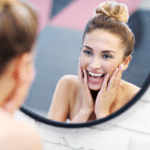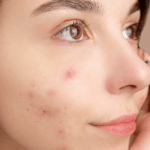Are you tired of dealing with stubborn blackheads that seem to never go away, no matter what you try?
Blackheads are a common skin issue that can be frustrating to deal with, but the good news is that there are natural remedies that can help. Instead of turning to expensive skincare products or harsh treatments, why not try some simple and natural solutions that you can find right in your own home?
In this article, we will explore what are blackheads, and what causes them, and of course, we will also talk about 10 effective ways to get rid of blackheads naturally, without resorting to harsh chemicals or procedures.
What Are Blackheads?

Blackheads are a type of acne that commonly appears on the skin, particularly on the nose, forehead, and chin. They are small, dark bumps that form when hair follicles become clogged with oil, dead skin cells, and bacteria.
Unlike whiteheads, which are closed pores that trap oil and bacteria beneath the skin, blackheads are open pores that are filled with a mixture of oil and dead skin cells that oxidize and turn black when they come into contact with air.
While blackheads are not harmful to your health, they can be unsightly and make your skin look and feel rough and uneven. Proper skincare can help to prevent and reduce the appearance of blackheads.
How Do Blackheads Form?

Blackheads form when the pores in the skin become clogged with excess oil, dead skin cells, and bacteria. The sebaceous glands in our skin produce sebum, an oily substance that helps to moisturize and protect the skin. When these glands produce too much sebum, or if the skin is not properly cleansed, the excess oil can mix with dead skin cells and bacteria, creating a plug in the pore.
Unlike whiteheads, which are closed pores, blackheads are open pores. The dark color of a blackhead comes from the oxidation of the oil and dead skin cells in the clogged pore when they come into contact with air. This oxidation process turns the mixture into a dark color, often black, which gives blackheads their name.
What Causes Blackheads?

As you already learned, blackheads are caused by the buildup of excess oil, dead skin cells, and bacteria in the pores of the skin, but what are the main causes of blackheads? Well, here are some…
1. Excessive sebum production
Our skin has sebaceous glands that produce an oily substance called sebum. When these glands produce too much sebum, it can mix with dead skin cells and bacteria to form blackheads. Some people may have naturally overactive sebaceous glands, making them more prone to blackheads.
2. Hormonal changes
Hormonal changes can affect sebum production, making blackheads more likely to form. During puberty, the body produces higher levels of hormones, such as androgens, which can increase sebum production. Hormonal changes during menstruation, pregnancy, and menopause can also affect sebum production and contribute to blackheads.
3. Poor skincare habits
Neglecting to cleanse the skin regularly or using harsh skincare products can irritate the skin and lead to the overproduction of sebum, which can contribute to blackhead formation. It is important to use gentle cleansers and moisturizers and to avoid scrubbing the skin too vigorously.
Read: 10 Bad Skincare Habits That Could Damage Your Skin
4. Diet
Research has shown that a diet high in refined carbohydrates, sugars, and dairy products can increase sebum production and contribute to acne and blackhead formation. Eating a healthy, balanced diet that is rich in fruits, vegetables, whole grains, and lean protein can help to reduce the risk of blackheads.
5. Genetics
Some people may be more prone to blackheads due to their genetic makeup. If your family members have a history of acne or blackheads, you may be more likely to develop them as well.
6. Environmental factors
Exposure to pollutants and humidity can also contribute to blackhead formation. Air pollution can clog pores, and humidity can increase sebum production. It is important to protect your skin from these environmental factors by wearing sunscreen and avoiding exposure to pollutants whenever possible.
Overall, blackheads are a common skin condition that can affect people of all ages and skin types. While they are not harmful, they can be unsightly and make your skin look and feel rough and uneven.
How to Get Rid of Blackheads Naturally

While there are many products available on the market to help reduce the appearance of blackheads, there are also natural remedies that can be effective.
And here are 10 ways to get rid of blackheads naturally, using ingredients that you may already have in your kitchen or bathroom cabinet.
1. Facial steaming
Facial steaming can help to open up the pores and loosen the buildup of oil and dead skin cells that contribute to blackheads. Boil water in a pot, remove from heat, and place your face over the steam with a towel draped over your head for 5-10 minutes.
Read: How to Steam Your Face: Tips and Tricks
2. Clay masks
Clay masks can help to absorb excess oil and impurities from the skin, making them a useful tool for reducing the appearance of blackheads. Apply a clay mask to your face and leave it on for 10-15 minutes before rinsing off with warm water.
3. Exfoliation
Exfoliating the skin can help to remove dead skin cells and other impurities that can contribute to blackhead formation. Use a gentle exfoliating scrub or a brush to gently massage the skin in circular motions.
Read: 10 Amazing Ways to Exfoliate Your Skin Naturally
4. Tea tree oil
Tea tree oil has antibacterial properties that can help to reduce inflammation and prevent blackheads from forming. Dilute tea tree oil with a carrier oil and apply it to the affected area.
5. Apple cider vinegar
Apple cider vinegar can help to balance the skin’s pH levels and reduce the appearance of blackheads. Mix equal parts water and apple cider vinegar and apply to the skin with a cotton ball.
6. Honey
Honey has natural antibacterial properties that can help to reduce inflammation and prevent blackheads from forming. Apply honey to the affected area and leave it on for 10-15 minutes before rinsing off with warm water.
7. Lemon juice
Lemon juice contains alpha-hydroxy acids that can help to exfoliate the skin and unclog pores. Apply lemon juice to the affected area and leave it on for 10-15 minutes before rinsing off with warm water.
8. Baking soda
Baking soda can help to exfoliate the skin and remove excess oil and impurities. Mix baking soda with water to form a paste and apply to the affected area, massaging gently before rinsing off with warm water.
9. Witch hazel
Witch hazel has astringent properties that can help to tighten pores and reduce the appearance of blackheads. Apply witch hazel to the affected area with a cotton ball.
10. Aloe vera
Aloe vera has anti-inflammatory properties that can help to reduce redness and inflammation associated with blackheads. Apply aloe vera gel to the affected area and leave it on for 10-15 minutes before rinsing off with warm water.
Read: 10 Reasons Why Aloe Vera is Good for Your Skin
Note: It is important to patch-test any natural remedy before applying it to the entire face, as some ingredients may cause irritation or allergic reactions. Also, these natural remedies may not work for everyone and may not be as effective as medical treatments for more severe cases of blackheads.
Takeaway
In conclusion, blackheads can be frustrating and difficult to get rid of, but there are many natural remedies that can help reduce their appearance.
By incorporating some of the natural remedies discussed in this article, such as facial steaming, clay masks, and tea tree oil, into your skincare routine, you can help to prevent and reduce the occurrence of blackheads.
It is important to remember that everyone’s skin is unique, and what works for one person may not work for another. If your blackheads persist or become severe, it may be best to consult a dermatologist for professional advice and treatment options.




